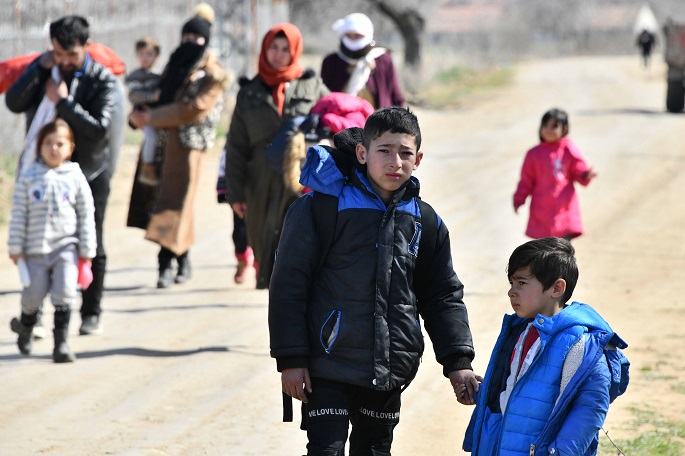Turkey's vulnerable refugee community faces coronavirus risk
Published : 22 Mar 2020, 21:13
As Turkey has adopted strict measures to curb the spread of COVID-19, millions of Syrians living in the country are still facing the risk from the outbreak of the coronavirus as they are one of the most vulnerable groups.
There are nearly four million refugees living in Turkey which hosts the world's largest refugee community. Besides 3.6 million Syrians, tens of thousands of Iraqi, Afghan and Iranian asylum seekers are scattered across the country.
In recent weeks, following Turkey's decision to open its borders to migrants traveling to Europe, thousands of asylum seekers rushed to the land border with Greece, where some of them are still camping in squalid conditions, exposed to the risk of the deadly virus.
Experts stressed that the drastic measures taken by Turkey where 947 cases have already been reported should be applied to everyone, but the refugee group has limited access to health service, causing a potential risk for the entire nation.
"Refugees are vulnerable and how can they boost their immunity to combat the outbreak of the coronavirus when most of them still can't afford enough food or other basic needs?" Didem Isci, expert of migration at the Ankara-based Bosphorus Migration Studies, told Xinhua.
The expert stressed that while the Turkish government "has until now done its utmost to accommodate millions of refugees," there is a lack of information regarding their situation facing the outbreak of COVID-19.
"As far as I can see, there has been no statement whether they still can apply to hospitals which are crowded because of the virus," Isci said.
"I can only imagine that in these extraordinary times when Turkish citizens are facing many kinds of trouble, they (refugees) are even facing more," the expert added, pointing out to the "language barrier" of Syrians who speak Arabic.
Turkey is in a state of partial lockdown with all public places, schools, restaurants, bars, cafes and borders with many states are closed. Citizens are advised to stay at home for at least two weeks while the number of confirmed cases is expected to increase.
If Syrian refugees show symptoms, they have to call the Health Ministry's hotline and ask for an Arabic translator. The ministry published last week a guide in Arabic, explaining the virus and how it is spread.
Despite these drastic measures, Syrians are continuing to work in businesses across Turkey as the government has not decided a ban on all private enterprises, advising them to take the necessary precautions.
"I am still working and my boss has distributed masks and gloves to the employees ... and explained how the virus can be transmitted, telling us to be careful," Mohammad Souri, a 24-year-old Syrian from Aleppo of Syria, to Xinhua.
The young man works in a small furniture workshop in capital Ankara's suburbs with other refugees and a Turkish workforce.
"We have been told that if the government decides to close all businesses, we will abide by it, but we don't know yet if we would get paid during the break, which would be a problem because my family depends on me," he said.
He added that the dispensary in his neighborhood where many Syrians live is treating Syrians as before with additional sanitary precautions and without notable problems for now.
Isci warned that undocumented refugees and asylum seekers who have no identification cards could eventually be denied tests and even treatment. This is a factor that would eventually threaten everyone.
"There should be no restrictions in such a crisis on tests and treatment. I am convinced that authorities, who have until now managed the refugee crisis well despite all odds, are well aware that fighting against the coronavirus is a collective action," she said.
"Everyone should respect confinement measures and personal hygiene and we are all together in this struggle," a Turkish health official told Xinhua on condition of anonymity, declining to answer if any Syrians have been tested.
Besides the refugees living in Turkey for several years, Turkey is also left to deal with nearly 1 million displaced Syrians amassed near its southern border, who fled clashes in the Idlib province, Syria's last rebel-held stronghold that the Syrian government forces are trying to recapture since last December.
The United Nations said that nearly 1 million internally displaced people in Syria are seeking shelter along the closed border with Turkey in packed and muddy camps that lack basic facilities, such as toilets and showers.
Syrian officials said that there is no coronavirus case in the country so far.


